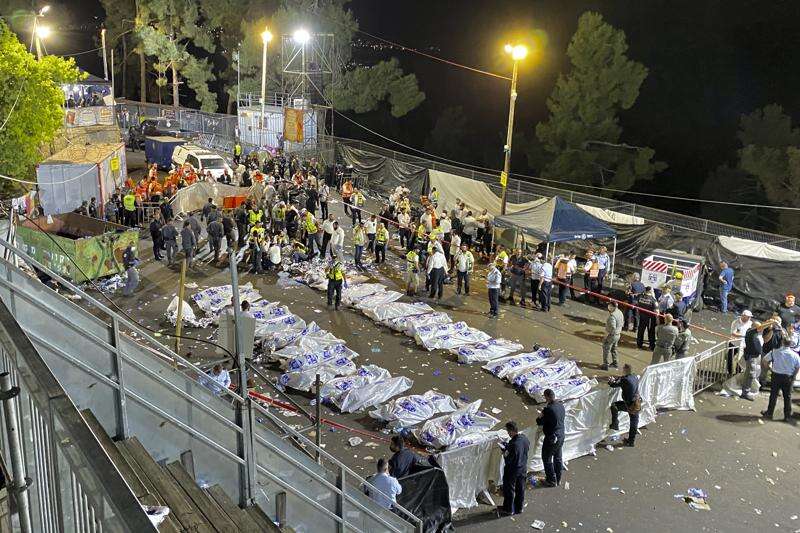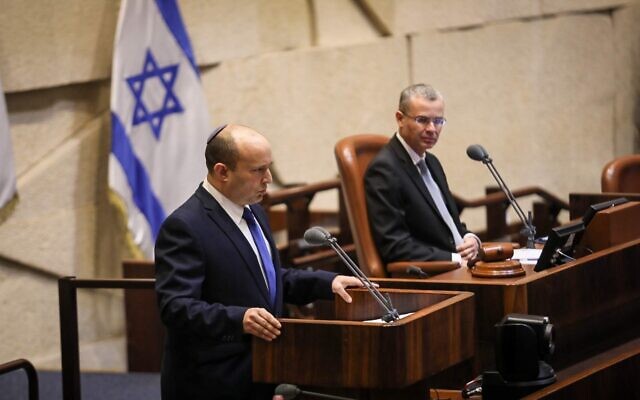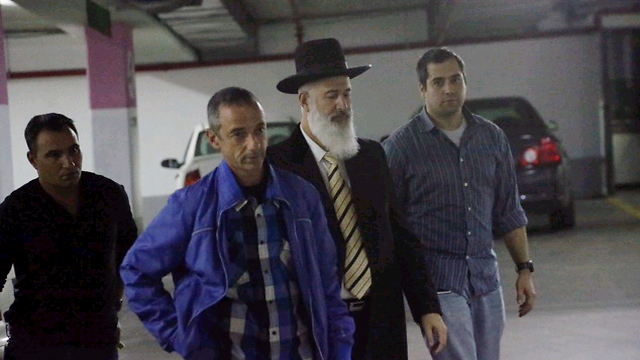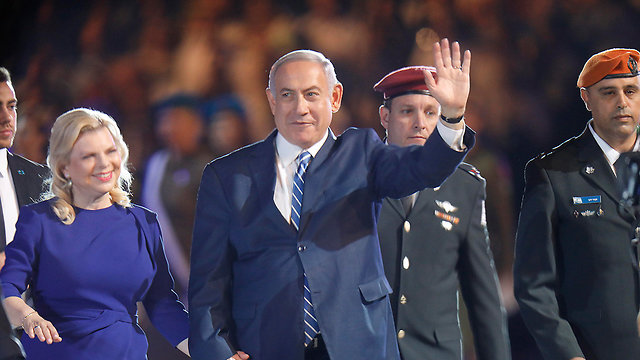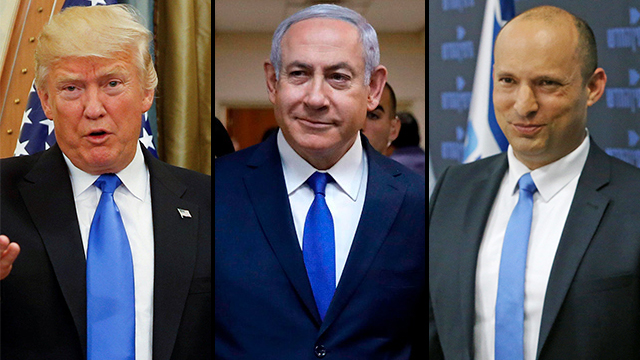There were two amazing speeches that were not heard this week. One was that of new prime minister Naftali Bennett, whose speech was drowned out by heckling. The other was that of alternate prime minister Yair Lapid, who opted not to give his speech after the circus surrounding Bennett's speech. Both these speeches deserve to be heard, and are printed below. I personally found them tremendously inspirational, and I hope you do too.
Full text of Naftali Bennett's speech:
His Excellency President Reuven Rivlin; President-elect Isaac Herzog; Mr.
Prime Minister Benjamin Netanyahu; President of the Supreme Court,
Justice Esther Hayat; Speaker of the Knesset Yariv Levin; my partner in
forming the Unity Government, Member of Knesset Yair Lapid, and his wife
Lihi; Ministers of the outgoing government; Ministers of the incoming
government; Members of Knesset; honored guests.
I
want to begin my words by saying, on my own behalf, and in the name of
the members of the designated government, in the name of this House, and
in the name of all the citizens of Israel – thank you. Thank you to the
outgoing Prime Minister, Benjamin Netanyahu, for your many years of
service, replete with achievements, for the sake of the State of Israel.
As Prime Minister you acted throughout many years to embolden Israel’s
political, security, and economic strength. I saw you from up-close, in
extensive security deliberations, late into the night, investigating,
making inquiries and considerations out of a sense of grave
responsibility.
Benjamin
and Sara Netanyahu, over the years, we have not always agreed, but we
have both sacrificed much on a personal level in order to serve our
people, the people of Israel. Expressing gratitude is a fundamental
principle in Judaism. This is the time for the people to say to you,
thank you.
I also
want to take this opportunity to express my deep appreciation to the
Tenth President of the State of Israel, Reuven Rivlin, for his years as
President, as Speaker of the Knesset, and as a public servant. And to
congratulate President-elect, Isaac Herzog, and wish him much success.
God willing, we will work together very well.
Honored
ladies and gentlemen, this is a special moment. The moment in which the
baton of leading the people and the country passes – as in a relay race
– to the next generation. It a sacred endowment.
The
State of Israel is not ‘just another country’. It is the dream of
generations of Jews – from Marrakesh to Budapest, from Bagdad to San
Francisco – a dream we merited to see realized every day before our very
eyes. Each generation has its own challenges, and out of each
generation comes the leaders that can overcome them.
The
external challenges we face are great: the Iranian nuclear project,
which is moving towards a crucial point; the ongoing war on terror;
Israel's image in the world and the unfair treatment it receives in
international institutions – these are all sizable and complex tasks.
At
this time, we are also facing an internal challenge. The ongoing rift
in the nation, as we see in these very moments, which continues to rip
apart the seams that hold us together, and has thrown us – one election
after another – into a maelstrom of hatred and in-fighting.
Such
quarrels, between the people who are supposed to be running the
country, led to paralysis. One who quarrels, cannot function.
And
so Israel ceased to be managed: a lack of governance in the Negev and
loss of the South for 12 years, riots in mixed cities, the lack of state
budget, the terrible disaster in Meron.
Dear
friends, in the guests gallery today, sits Maya Moreno, widow of my
friend, Lieutenant Colonel Emmanuel Moreno, of blessed memory. At every
important juncture of my life, I think of Emmanuel. The intensity of his
devotion and sense of mission guides us.
Friends,
as the Jewish people tend to be people with opinions… and as we see
here, the Parliament of the Jewish state, is a parliament of opinions,
and anyone who has ever seen a pair of students studying Talmud
together, or a heated debate about a product in the office corridors of
an Israeli start-up, understands the force for good of “disputes for the
sake of Heaven”. But there are points in Jewish history in which the
disagreements between us have gone out of control, in which they were no
longer “disputes for the sake of Heaven”, times in which they
threatened us, and all that we have built with our sweat and blood.
Twice
in history, we have lost our national home precisely because the
leaders of the generation were not able to sit with one and another and
compromise. Each was right, yet with all their being right, they burnt
the house down on top of us. I am proud of the ability to sit together
with people with very different views from my own.
This
time, at the decisive moment, we have taken responsibility. We
understood that we have to safeguard our home. To continue on in this
way – more elections, more hatred, more vitriolic posts on Facebook – is
just not an option. Therefore, we stopped the train, a moment before it
barreled into the abyss. And I want to thank my friend, Foreign
Minister-designate, MK Yair Lapid, who showed national responsibility,
political generosity, and without whom we would not be here today.
The time has come for different leaders, from all parts of the people, to stop, to stop this madness.
The
government that will be formed represents many of Israel’s citizens:
from Ofra to Tel Aviv, from Rahat to Kiryat Shmona. Precisely here lies
the opportunity. Our principle is, we will sit together, and we will
forge forward on that which we agree – and there is much we agree on,
transport, education and so on, and what separates us we will leave to
the side.
To the
citizens of Israel I say: this is a sensitive moment, of political
change. I call on all, to demonstrate maturity and restraint.
The
new government will be a government which strives for real, practical
solutions, to the problems faced by the country and its citizens. The
work-plan which we are presenting today is the most detailed in years.
We have come to work. To remove the barriers, to free up the jams, and
to turn our country into what it can be.
The following, are some of the things the government will promote immediately:
We
will take responsibility for the education of Israeli children from
birth. The most formative years. As a first step, we will transfer
responsibility for infant daycare to the Ministry of Education.
We
will enable many ultra-Orthodox youth to go out to work by lowering the
(national service) exemption age from 24 to 21. Not by force, but by
positive encouragement, allowing young people who want to learn a
vocation to be able to, and those who want to study Torah will continue
to do so.
We will
close with immediate effect the Ministry of Digital Affairs, the
Ministry for Water, the Ministry for Communal Advancement, and the
Ministry for Strategic Affairs.
Foreign
Minister-designate and Alternate Prime Minister-designate, Yair Lapid,
will lead a process to rehabilitate the Ministry of Foreign Affairs,
which is a fundamental tool for building Israel’s political strength.
Finance
Minister-designate Avigdor Lieberman, will lead a plan by which we will
return to work those who lost their employment due to COVID-19. We will
bring in as many people as possible in the high-tech industry, where
there are higher salaries, by setting a national target of raising the
number of high-tech workers to 15% of the workforce by 2026.
We
will reduce superfluous regulation and frustrating bureaucracy, and we
will work for citizen-friendly government services, as in Singapore
among other countries – without paperwork, without queues.
We will make life easier for independent workers and small business owners, including through unemployment benefits.
We will increase income support for the elderly to 70% of the minimum wage.
We
will open up competition in Kashrut (kosher certification), and set
standards for the system. This will lighten the burden on restaurant
owners, ending the stranglehold monopoly in this area, bringing down the
cost of food, and strengthening the public’s faith in the level of
Kashrut.
Justice
Minister-designate Gideon Saar will lead a process to create an
appropriate balance between the judicial, legislative, and executive
branches of government, whereby his initiative to split the role of the
Attorney General is a significant first step.
We
will – finally – promote a national plan for the North of Israel,
including establishing a hospital and a university in the Galilee.
Defense
Minister Benny Gantz will lead a process to significantly strengthen
and build up the IDF through a multi-year plan, which will include
significant investment in offensive and defensive capabilities. We must
invest because the threats will not leave us. Our soldiers deserve the
best and most advanced equipment in the world.
We will work to upgrade Israel’s public transport system, led by Transport Minister-designate Merav Michaeli.
We will strengthen the building of communities across the Land of Israel.
We
will ensure Israel’s national interests in Area C – and we will
increase standards to that end after much neglect in this area.
And
yes my friends, we will open a new page in the relations between the
State of Israel and the country’s Arab citizens. The Arab community will
be represented in the coalition by Mansour Abbas and his party. This is
a process that I must give credit to Prime Minister Netanyahu who held a
groundbreaking series of meetings with Mansour Abbas, who reached out a
hand. This was the right thing to do. We understand the plight and
needs of the Arab society. The fight against crime and violence, the
housing crisis, the gaps in education and infrastructure – will be
addressed.
We will
begin the process of regulating the Bedouin settlements in the Negev,
so that Israel’s Bedouin citizens can live in dignity.
Health
Minister-designate Nitzan Horowitz, will prepare the health system for a
new age of community, and home based medical care, and together we will
prepare an emergency plan in the case of future pandemics. You can’t
always know there will be a vaccine, not every illness has a vaccine,
and you have to be prepared to build on vaccinations, but also on an
organized plan and not as we saw in the last year.
We
will accelerate the pace of building homes in Israel. The government
will take the initiative, remove obstacles, and allow for extensive
construction throughout the country, in order to but the breaks on the
rise in the cost of housing. There has been a slowdown in the building
of houses in the last year – we should be seeing the opposite – we
should have increased the building, there is a deficit in housing which
drives up the prices, and no propaganda will hide that. Therefore we
will up the pace of building to but the brakes on the rise in prices,
and allow young people – who serve in the army, fulfil reserve duty, pay
their taxes, and have no chance of building a house. So yes, we need to
deal with this.
The government will work to promote Jewish immigration (Aliyah) to Israel, and the best integration for them.
We
will strengthen the bond between the State of Israel, and the Jews of
the Diaspora. We will care for our brothers and sisters around the
world, we will fight against the wave of antisemitism.
We will safeguard the State of Israel, the nation state of the Jewish people, as a Jewish and democratic state.
And that is just part of our plans. As I said, we have come to work! For everyone.
From
here, I turn to the ultra-Orthodox community. Although the
ultra-Orthodox parties chose not to join the coalition, that does not
mean you are not represented - I will represent you, we will represent
you. The new government will respect the study of Torah, the Torah which
kept us safe for so many years in exile, and at the same time will work
to remove the barriers which prevent the ultra-Orthodox community’s
integration into the employment market, and Israeli society. Instead of
perpetuating the same methods, we will have the opportunity to address
the deep problems which burden ultra-Orthodox society: key amongst them
the housing crisis. The pace of construction of apartments,
neighborhoods, and cities simply does not keep up with natural growth,
and there is room for the establishment of new ultra-Orthodox
neighborhoods and even a new city in Israel.
I
was asked by the father of Eliyahu Shmuel, of blessed memory – a 16
year old ultra-Orthodox boy, who was killed in the Meron Disaster – to
remember him in my swearing in address. Eli was a sweet child. He always
helped his friends, and saw the good in everyone. We will not forget
Eli, and we will not ignore his death. A State Commission of Inquiry
will be set up.
Honored
ladies and gentlemen. The government is setting out on its path, as the
greatest threat to Israel, the Iranian nuclear project, is reaching a
critical point. The Middle East is still yet to recover from the effects
of the first nuclear deal, which emboldened Iran to the tune of
billions of dollars, and with international legitimacy.
Iran,
through its Quds Force of the Revolutionary Guard, has established
terrorist outposts - from Syria, through Gaza and Lebanon, and to Yemen.
Renewing the nuclear deal with Iran is a mistake that will once again
lend legitimacy to one of the most discriminatory and violent regimes in
the world.
Israel
will not allow Iran to be equipped with nuclear weapons. Israel is not
party to the agreement, and will maintain full freedom to act.
Last
month, we received a reminder that the conflict with the Palestinians
is still here. We must remember, and remind the world, that our enemies
deny our very existence in the Land of Israel, and that this is not a
dispute over territory.
We
need military strength, civil resilience, and a belief in the justness
of our path at times when the conflict raises its head.
I
hope the ceasefire in the south is maintained. But if Hamas again
chooses the path of violence against Israeli civilians, it will
encounter a wall of iron.
Violence
and terrorism are not a natural phenomenon or destiny with which we are
supposed to just come to terms. The Palestinians must take
responsibility for their actions, and understand that violence will be
met with a firm response.
That said, security calm will lead to economic moves, which will lead to reducing friction and the conflict.
To
the Goldin, Shaul, Mengistu, and Sayed families. The government led by
me will work to bring home the IDF’s fallen, and the Israeli citizens
held in Gaza by Hamas. We see in their return a sacred duty, which
should be undertaken out of responsibility.
The
government will work to establish and expand peace agreements with the
Arab states, to increase regional economic, entrepreneurial, and
cultural cooperation, and to deepen the direct connection between the
peoples of the region, such as the connection between the citizens of
Israel and the citizens of the United Arab Emirates.
Dear
friends, on behalf of us all, I want to thank the President of the
United States of America, Joe Biden, for standing alongside Israel
during the last operation in Gaza, “Guardian of the Walls”, and for his
longstanding commitment to the security of Israel.
President
Biden said during the operation, “Until the region says, unequivocally,
they acknowledge the right of Israel to exist as an independent Jewish
state, there will be no peace”.
It is important that this message be heard, and internalized, in the Middle East.
We
greatly appreciate the support of the United States, our greatest
friend. My government will make an effort to deepen and nurture
relations with our friends in both parties – bipartisan. If there are
disputes, we will manage them with fundamental trust, and mutual
respect.
My fellow
Members of Knesset, in light of the ongoing turbulent debate, the
people are looking to the House. Let us maintain respectful debate. I
understand those for whom today is difficult, but friends, this is not a
day of mourning. There is no Disengagement here. There is no harm being
caused to anyone. There is a change of government in a democracy.
That’s it. And I assure it is a government that will work for the sake
of all the people. We will do all we can so that no one should have to
feel afraid. We are here in the name of good, and to work. And I say to
those who intend to celebrate tonight, don’t dance on the pain of
others. We not enemies, we are one people.
Now,
hours before accepting this responsibility, I pray to God that He grant
me wisdom and understanding to lead the State of Israel.
“Heavenly
Father, Rock and Redeemer of Israel, bless the State of Israel, the
first flourishing of our redemption, guard it in your abundant kindness,
spread over it the shelter of Your peace. Send forth your light and
truth to its leaders, ministers, and advisors, and grace them with Your
good counsel. Strengthen the hands of those who guard our holy land,
grant them deliverance, and adorn them in victory. Give peace in the
land, and grant its inhabitants eternal happiness.”
With God’s help, we will do and we will succeed. Amen.
Members
of Knesset, I am now honored to present before you the government what
we have formed, in alphabetical order (in Hebrew).
Naftali Bennett – Prime Minister and Minister for Settlement Affairs
Yair Lapid – Minister of Foreign Affairs, and Alternate Prime Minister
Ministers affiliated with the Prime Minister:
Ayelet Shaked – Minister of the Interior
Gideon Sa'ar – Minister of Justice
Ze’ev
Elkin – Minister of Housing and Construction, Minister of Jerusalem and
Heritage, and Minister Responsible for Government Liaison with the
Knesset
Yoaz Hendel – Minister of Communications
Yifat Shasha-Biton – Minister of Education
Matan Kahana – Minister for Religious Affairs
Ministers affiliated with the Alternate Prime Minister:
Avigdor Lieberman – Minister of Finance
Orit Farkash HaCohen – Minister of Science and Technology
Orna Barbivai – Minister of Economy
Benjamin Gantz – Minister of Defense
Hili Tropper – Minister of Culture and Sport
Hamad Amar – Minister in the Finance Ministry
Yoel Razvozov – Minister of Tourism
Meir Cohen – Minister of Labour, Welfare, and Social Services
Meirav Cohen – Minister of Social Equality
Merav Michaeli – Minister of Transport and Road Safety
Nachman Shai – Minister of Diaspora Affairs
Nitzan Horowitz – Minister of Health
Oded Forer – Minister of Agriculture and Development, and Minister of the Periphery, the Negev and the Galilee
Issawi Frej – Minister for Regional Cooperation
Omer Bar Lev – Minister for Internal Security
Pnina Tamano Shata – Minister for Immigration and Absorption
Karine Elharrar – Minister for Energy
Tamar Zandberg – Minister for Environmental Protection
The date of the handover between the Prime Minister and the Alternate Prime Minister is August 27, 2023. I
request, Mr. Speaker, that the Members of the Knesset express their
support for the Unity Government, so that we may begin to restore
stability and functionality to the State of Israel. Thank you.
Mr. President, Mr. Speaker, Knesset, Prime Minister Designate, outgoing Prime Minister, President of the Supreme Court, honored guests.
In the Book of Judges, the phrase “the land was peaceful for 40 years” appears three times. I don’t know what will happen in 40 years, but let us all hope that in the future, we will be able to say of the government we are forming today: “the land was peaceful for 40 years.”
Because that is what we need. Israel is hurting. It is time for peace in this land.
In a democratic country, governments rise and fall. A generation goes and a generation comes. That is the natural order of things. This is a complicated coalition, maybe the most complicated in the country’s history, but the reason for its creation is actually simple: it is time.
It’s time. It is even a little late. This change is unavoidable because time does not stop. It’s time to change the operating system; it’s time for a change of generation.
But before we look to the future, we have another task — we need to find a way to forgive one another for the past. Hate is a prison, and forgiveness is the way out.
I look at the past few years in the life of this country: the protests, the anger, the terrible things that have been said in this hall. I don’t want to be held hostage by those years.
In the past six years, I have sat in the opposition. Much of that time, I have been angry at the way the government treated us. The solution is not to treat them the same way. The solution is to behave differently.
I want to say to the opposition from this podium — our door will be open to you. We know that the public that voted for you has real needs. We won’t agree on everything, but we will always listen.
The past few years have seen us all turned from people into labels — right, left, secular, Haredi, Jewish, Arab. This government has been formed so that we stop being labels and revive our common identity, people, with all our complexities.
One of the Haredi Knesset Members sent me a message just before Shabbat which said, “The Kotzker Rebbe defined the saying, ‘Just as their faces are not the same, so their opinions are not the same’ as meaning, ‘Just as no person is angry that his friend has a different face, so no person should be angry at his friend’s different opinions.’” And then he added: “Let us hope for days of common good.”
If the Kotzker Rebbe had known his words would become a WhatsApp message full of good intentions between two Knesset Members, one Haredi and one secular, in a free and democratic Israel, then I think he would have been pleased. I believe he would have said to us, “It cannot be that you do not see how close you are.” We have an argument between us over politics and values, but we are not enemies. We live here together. Our fate is intertwined.
After all the insults and the warnings, the real divide in Israeli society isn’t between left and right. The real divide is between moderates and extremists. Those who want to build and those who want to destroy.
We will not let the extremists destroy the State of Israel. We will not let hate control us. Violent racists do not become patriots just because they wrap themselves in a flag. They will not define for us what it means to love Israel.
We are not enemies. Even the most strident opinions, even the most heated arguments, will not turn us into enemies. We will not let extremists destroy our ability to speak to one another and to work together for the good of the country.
Melanie Klein, one of the great psychoanalysts, explained that, corresponding to the desire to destroy, people also have a desire to repair. We have within us something strong that seeks to heal the world and ourselves. This government was formed out of that desire.
We have a lot to fix.
We have to fix the discourse between us and we have to fix the sidewalks in Taybeh. We have to fix the internal medicine departments in our hospitals and the internal divides on religion and state. We have to fix our democracy and our relations with the Democratic Party in the United States. We have to fix the social gaps, and ensure that every child in Israel has a computer, and high-speed internet, and an equal opportunity to succeed.
It’s a lot of work. We have a lot of work to do. The only way to succeed is to work together. The cynics will mock — they always do — but cynics have never created anything.
If you want to build something, to create something, you need to trust other people. No home — a private one or a national one — was ever built by one person alone. The architect needs the engineer, the engineer needs the builder, the builder needs the brickmaker. This government was formed because we believe that our role is to build something better together. We believe that what connects us — what makes us one people and one nation and one country — is taking responsibility.
We are not only creating a government today, but also going back to the basic truth that our role is not only to look after ourselves, but also to look after one another. To care not only for people who think like us, but for all those who walk the Israeli journey with us.
This government was not formed for politicians. It was formed for teachers and engineers, farmers and police officers, small business owners, and Holocaust survivors, and school children.
It is being formed for Meital, the young woman with a nose piercing who stopped me in the street and said, “I didn’t vote for you, but you owe me.” And she’s right. I do owe her. Because she is the legal owner of the future we are being entrusted to build.
People ask us, what do you have in common? What is there in common between Merav Michaeli and Avigdor Liberman? What is there in common between Ayelet Shaked and Benny Gantz and Mansour Abbas? Between Gideon Sa’ar and Nitzan Horowitz? What is there in common between Yair Lapid and Naftali Bennett?
The answer is — this country. That is the thing that unites us. That’s our shared love. None of us thinks that we love the country more than the other. None of us has ownership over patriotism or love of the country.
What we have in common is the understanding that you cannot claim to love Israel if you hate half of the Israelis.
There is nothing easier than finding common ground between us, if you know where to look. The care for small businesses in the periphery. The importance we place on the education of our children and the healthcare of our parents. The understanding that the IDF needs to be strong and uphold clear moral values. The recognition that this country is governed by the rule of law and that we need to show zero tolerance to corruption, especially in the public sector. The understanding that it is the duty of the Jewish state to ensure civic equality for every citizen.
There is one more thing that we have in common; when something is broken we don’t look for someone to blame, but for a way to fix it. This government has come to fix what is broken. That is its role, its mission. That is the major change it brings with it.
Before I finish, I want to thank my incredible team that created and built this government: Hillel Kobrinsky, our commander, Dani Vesely, Dana Pitelis Kaduri, Naama Shultz, Gili Haushner, Yael Bar, Roei Konkol, Yair Zivan, Neta Attias, Tami Nassee, Ethel Hooven, Meir Cohen, Rami Yehudicha, Mark Mellman, Oded Gazit, and Guy Busy. Without you, it wouldn’t have happened.
Thank you to all the heads of the parties in the new coalition who came on board and worked and pushed, first and foremost my friend and partner, Prime Minister-designate Naftali Bennett. I believe in you. You will do great things for Israel.
Thank you to each of the Knesset members who brought us here today. Each of you had to show commitment and compromise. You put the country and your values before your personal interest.
I thank all the amazing people who went to stand on bridges and at junctions, they are the ones who brought us to this moment. And thank you to our Knesset members for your determination and wisdom and support.
And a final thank you to my support group, Lihi Lapid, Shulamit Lapid, my sister Merav Roth, Ilil, Yoav, Lior, and Yaeli, and to my father, who did a good job supervising from above.
Thank you.

